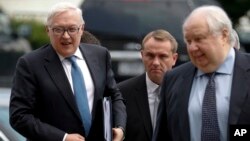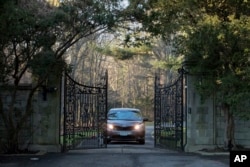Senior United States and Russian diplomats held "tough" talks on a range of issues Monday, but still “more work needs to be done,” according to the State Department.
U.S. Undersecretary of State Thomas Shannon and Russian Deputy Foreign Minister Sergei Ryabkov met Monday to discuss areas of mutual concern.
The State Department described the meeting as "tough, forthright, and deliberate, reflecting both parties' commitment to a resolution."
The issue of two closed Russian compounds in the United States was discussed. Then president Barack Obama ordered the compounds closed in December, after U.S. intelligence agencies concluded Moscow attempted to interfere in the 2016 U.S. presidential election.
Both sides agreed to meet again to work on bilateral issues, but no date was set.
Russia has demanded the closed compounds be returned. Foreign Minister Sergei Lavrov called the U.S. closure of the properties in (the eastern states of) New York and Maryland "daylight robbery."
Less than a month before he left office Obama also expelled 35 Russian diplomats, accusing them of spying, in response to the Russian election interference, a claim Moscow rejects.
Russia has refrained from a retaliatory response, but Lavrov said last week, "If Washington decides not to solve this issue, we will have to take counter actions," possibly by blocking use of a country house and storage facility used by U.S. embassy personnel in Moscow.
Lavrov, during a visit to Belarus, said "anti-Russian feeling" in the United States makes it uncertain whether Moscow and Washington can agree to cooperate on world issues.
In Moscow, Kremlin spokesman Dmitry Peskov told reporters, "We consider it absolutely unacceptable to place conditions on the return of diplomatic property; we consider that it must be returned without any conditions and talking."
Peskov said Russian President Vladimir Putin, blamed by the U.S. intelligence community for personally ordering the U.S. election interference, "quite unambiguously" raised the issue of the closure of the compounds when he met with President Donald Trump at the recent G-20 summit in Germany.
The Kremlin spokesman said Russia still has hope that "our American colleagues will show political wisdom and political will" and return the properties to Russian use.






